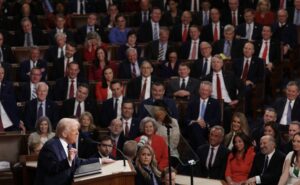As the National Association of Nigerian Students, NANS, expressed happiness with the court’s ruling and claimed that students had been the strike’s primary victims, ASUU quickly responded by saying that it will appeal the ruling today.
Similarly, parents under the auspices of the National Parent Teacher Association of Nigeria, NAPTAN asked the government and the union to comply with the court’s ruling.
Justice Polycarp Hamman’s ruling in the case came after the Federal Government requested an interlocutory injunction to compel ASUU, which has been on strike since February 14, to return to work.
The Federal Government’s lawyer, Mr James Igwe, had prayed the court to order the striking varsity lecturers too, in the interim, return to work pending the determination of the substantive suit before the court.
He maintained that the matter is not only urgent but also of great national interest as millions of students had been at home for over seven months.
“Section 47 of the Trade Dispute Act, TDA, gives your lordship the power to direct that no worker should continue to embark on strike pending when the applications are heard and determined,” Igwe argued.’
He contended that under section 18(1)E of the TDA, employees could not continue a strike when a matter was already referred to the industrial court for adjudication.
University students need to be able to return to their studies as soon as possible, according to Igwe, who also warned that if the strike is not called off, the nation as a whole will suffer irreparable harm.
He claims that since the Federal Government and lecturers’ legal dispute is already being heard by a judge, suspending the strike would be right and in the interests of justice.
In his ruling, Justice Hamman stated that the application is deserving of the court’s approval and is meritorious.
While dismissing objections ASUU raised through its lawyer, Mr Femi Falana, SAN, the court held that the strike is detrimental to public university students that could not afford to attend private tertiary institutions.
“The balance of convenience tilts in favour of the applicant. I hold that this application is meritorious and this application is granted,” Justice Hamman ruled.
The court, thereafter, issued an order restraining ASUU, “whether by themselves, members, agents, privies or howsoever called, from taking further steps and doing any act in continuance of the strike, pending the hearing and determination of the suit filed.”
It, however, declined to award costs against ASUU as the Federal Government had demanded.
It will be recalled that ASUU had embarked on an initial four weeks strike to press home its demands that included improved funding for universities, as well as a review of salaries for lecturers.
It subsequently extended the strike indefinitely on August 29, following a breakdown of negotiations between the union and the government.
While ASUU accused Federal Government of not being sincere in its negotiation, the government, through the Minister of Labour and Employment, Senator Chris Ngige, approached the court to compel the striking lecturers to return to the classroom.
Specifically, the government urged the court to “interpret in its entirety the provisions of Section 18 LFN 2004, especially as it applies to the cessation of the strike once a trade dispute is apprehended by the Minister of Labour and Employment and conciliation is ongoing.”
It also requested, “an order of the court for ASUU members to resume work in their various universities while the issues in dispute are being addressed by the NICN in consonance with the provisions of Section 18 (I) (b) of the TDA Cap T8. LFN 2004.”
ASUU had in a counter-affidavit filed before the court, opposed the suit on the premise that the Minister of Labour and Employment, Chris Ngige, lacked the power to order the court in the referral to direct it to call off the strike.
ASUU’s lawyer, Falana, SAN, argued that such referral amounted to a directive from the minister to the court.
He maintained that neither a minister nor the President could wield such powers as to control a court of competent jurisdiction.
Falana, SAN, argued further that FG failed to follow the due process as stipulated in part 1 of TDA 2004.
According to him, the law provided that such matter must first pass through the Industrial Arbitration Panel, IAP, before landing at the NIC.
Falana argued that ASUU would not have embarked on strike had the government kept to agreements and the Memorandum of Understanding, MoU, it signed with the union in the past.
Justice Hamman dismissed the objections and ordered the striking varsity lecturers too, in line with provisions of the TDA, to return to the classroom, pending the final determination of the suit before the court.
ASUU to appeal court order on resumption
However, the Academic Staff Union of Universities, ASUU, yesterday, vowed to appeal the order by the National Industrial Court, NIC, directing the suspension of its seven monthly old strike.
In a terse statement sent to members of the union, ASUU urged its members to “remain calm,” adding its lawyer, Femi Falana, SAN, was already filing an appeal.
The statement, entitled ‘NIC Back to Work Order on ASUU: Be Calm,’ read: “Our Comrade President, Victor Osodeke, has urged members of our great union to remain calm as there is no cause for alarm on the back to work order delivered earlier today.
“Our lawyer is filing an appeal and stay of execution of the judgment. Members should remain resolute and strong. A people united can never be defeated. Solidarity without compromise.”
The National President of NANS, Usman Barambu, said the Federal Government must, however, not see the ruling as a victory over ASUU.
“It is a win-win situation for all, the government, the students, parents and ASUU. It is not that the court has given the government a kind of victory over ASUU or that the government has boxed ASUU into a corner.
“As students, we are happy about the development as it is a sign of progress being made regarding how to resolve the face-off.
“We implore the government to meet the demands of ASUU, as the court said negotiation will continue while the matter is being heard.
“Also, the government should not, because of the fact that the matter is still before the court, treat the issue of negotiation with ASUU with levity. It is still a running matter.
“As students, we are happy that academic activities may soon resume in our university campuses,” he said.
Also reacting to the court order, yesterday, the Federal Government declared that nobody won or lost.
The government also said it would order vice-chancellors to reopen public universities in compliance with the order.
The Minister of Labour and Employment, Senator Chris Ngige, who stated this when he received members of Nigerian Association of Medical and Dental Academics, NAMDA, in his office, also assured that the court ruling didn’t preclude further negotiation between the Federal Government and ASUU.
He said: “The ruling is in the best interest of the nation. It is a win-win situation for all of us— government, students, lecturers— all Nigerians indeed. I have just got the order of the court asking ASUU to go back to work.It is a sound judgment.
“It is no victor, no vanquished. You doctors in academics are for now members of ASUU, but, you are here, even though you have dissociated yourself and you are working. We want to thank you for working and teaching your students.
“The court ruling does not preclude us from going on with further negotiation and consultations. The pro-chancellors met Mr President and made some demands, such as topping up government offers and seeing whether there could be some bailout. Mr President said in considering it, he will consult stakeholders. So, he is going to consult everybody.”
Ngige welcomed the intervention of the House of Representatives in the ASUU imbroglio, saying he is happy that the Speaker, Femi Gbajabiamila, said they were going to meet the President on the issue.
He said the intervention was timely, considering that the president must have also consulted some stakeholders.
Ngige added that whatever money to be put in would go into the 2023 appropriation bill where the National Assembly comes in.
“If they have shown interest now, it is good and wonderful. When they bring that proposal, the executive will not have any problem. ASUU should also know that this is a step in the right direction.
“All these things have been promised them by the Minister of Education at their last meeting with him. For me, they should do the needful and get back to the classroom,’’ he said.



























